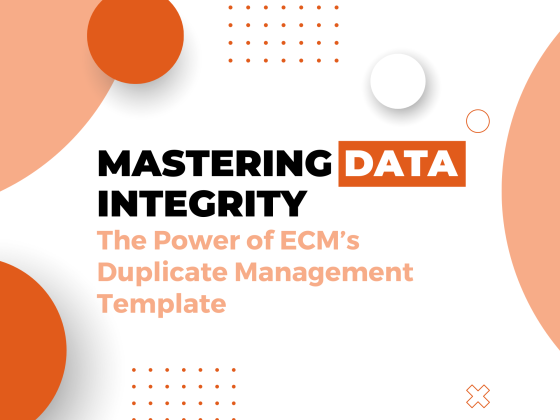Mastering Data Integrity: The Power of ECM’s Duplicate Management Template
In the realm of human services, where every piece of data holds the potential to transform lives, maintaining accuracy and integrity is paramount. Yet, amidst the challenges of evolving information, and system limitations, duplicate records can emerge, casting doubt on the reliability of your organization’s data. Enter Exponent Case Management (ECM) and its revolutionary Duplicate Management Template, designed to empower frontline staff and administrators alike in the battle for data integrity.
Understanding the Duplicate Dilemma:
Duplicate records present more than just a minor inconvenience; they pose a significant obstacle to your organization’s efficiency. Imagine a client entering your system only to encounter duplicate entries and inaccurate data, leading to confusion, skewed analytics, and compromised decision-making.
Duplicate records stem from a variety of sources, reflecting the complexities inherent in managing client data within human services agencies. These challenges include:
- Spelling Mistakes: In multicultural environments, variations in spelling are common, particularly among non-English speakers or clients with limited literacy skills. Additionally, case managers may inadvertently make simple spelling errors while entering names, further contributing to duplicate records.
- Nicknames: Clients often use different names interchangeably, whether due to personal preference, cultural norms, or situational factors. This fluidity in nomenclature complicates data entry and increases the likelihood of duplicate records.
- Contact Information Changes: Individuals and families accessing social services frequently experience fluctuations in their living arrangements and contact details. These changes, driven by circumstances such as housing instability, job loss, or family dynamics, pose a significant challenge for case managers. If a client provides different address or phone number details across multiple interactions, coupled with slight discrepancies in name spelling or the use of nicknames, the risk of duplicate records escalates.
- Data System Shortcomings: Despite the advancements in data management technology, many systems fall short in effectively detecting duplicate records. Notifications may be overlooked or ignored, leaving duplicate entries undiscovered and unresolved.
From our interactions with customers, it’s evident that human services agencies expend considerable time and effort grappling with duplicate data. The constant struggle to prevent, identify, and rectify duplicate records diverts resources away from core mission activities, hindering organizational efficiency and eroding staff morale.
In light of these challenges, it’s imperative for agencies to adopt proactive solutions that streamline data management processes and enhance system capabilities. By addressing the root causes of duplicate records and implementing robust duplicate management protocols, organizations can reclaim valuable time and resources, empowering staff to focus on delivering impactful services to those in need.
The Exponent Case Management Advantage
At ECM, we recognize the urgency of this challenge and have crafted a solution that addresses its root causes. Our Duplicate Management Template isn’t just about catching duplicates; it’s about preventing them from ever materializing via a series of best practices embedded directly into the template. Through sophisticated matching rules and intuitive notifications, frontline staff are equipped to identify and avoid duplicate records right from the outset, streamlining workflows and ensuring data accuracy from the get-go.
Empowering Early Detection
But what if a potential duplicate slips through the cracks? ECM has you covered. With our template, every instance of case record access triggers a vigilant notification system, alerting users to possible duplicates and enabling swift corrective action. Early detection becomes the norm, minimizing the impact of data quality issues and preserving the integrity of your database.
Efficiency Through Consolidation
Recognizing that duplicates may still arise, ECM has made it easier to merge with a third-party tool, allowing administrators to consolidate records effortlessly. Through user-friendly interfaces and customizable data selection, the task of reconciling duplicates becomes not just manageable but efficient, freeing up valuable resources for frontline service delivery.
Continuous Vigilance, Endless Solutions
But our commitment to data integrity doesn’t end there. With ECM’s Duplicate Management Template, administrators gain access to comprehensive monitoring reports and dashboards, providing real-time insights into duplicate records’ prevalence and progress. Armed with this information, organizations can proactively address emerging issues, safeguarding data integrity for the long haul.
Conclusion
In the pursuit of social impact, every data point matters. With ECM’s Duplicate Management Template, the journey towards reliable, impactful data begins. Say goodbye to the chaos of duplicates and embrace a future where data integrity paves the way for transformative change. Together, let’s unlock the full potential of your organization’s data and drive radically better impact—one duplicate at a time.
Learn more about ECM’s Duplicate Management Template and embark on your journey towards data integrity today. Contact us for a consultation today!
A note for existing ECM customers:
For existing clients, you can access our Duplicate Management features within the ECM core product with additional configuration. Additionally, we invite you to explore our Duplicate Management Template for a swift and efficient implementation of comprehensive duplicate management strategies.
For further guidance and assistance, visit the Customer Success Center for ECM documentation and support. Our dedicated team is poised to assist you at every turn as you embark on this journey towards enhanced data integrity and operational efficiency.



